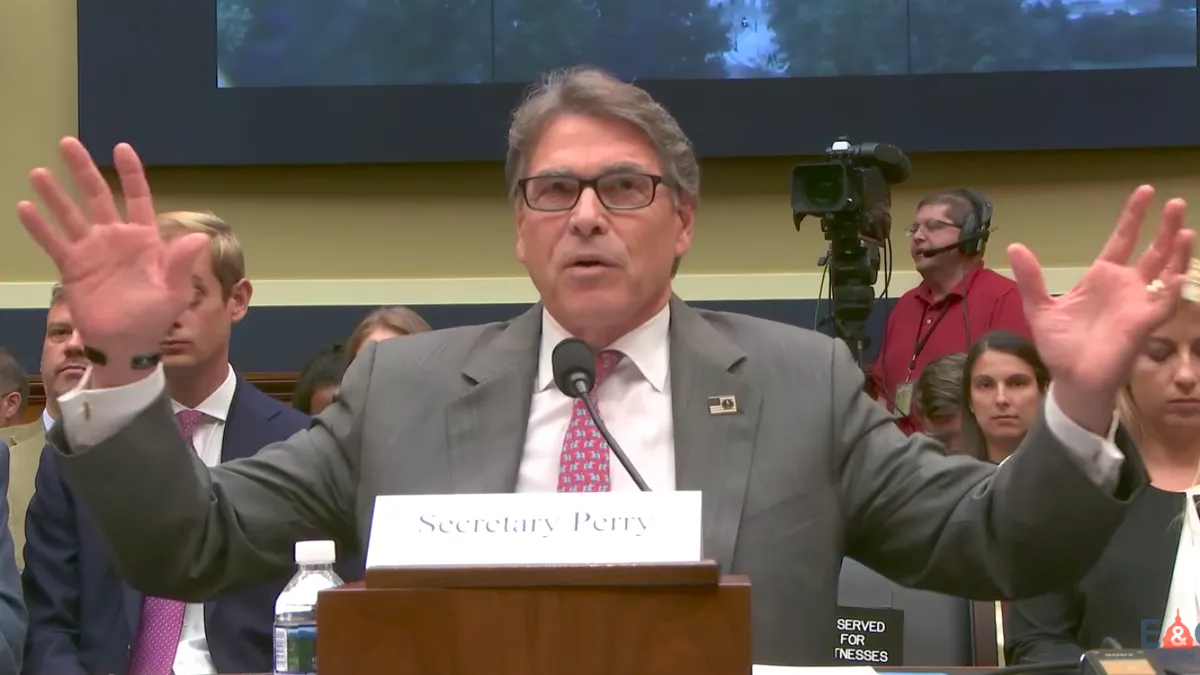Dive Brief:
- Secretary of Energy Rick Perry said Monday that plant economics are not "the issue" DOE is focused on as it evaluates an emergency bailout request from generator FirstEnergy.
- One of Perry's deputies last month said DOE "would never use" an emergency order under Section 202(c) Federal Power Act to prop up uneconomic generators. Asked if he stood by that statement, Perry told Utility Dive "I don't think economics — I don't think that's the issue."
- Perry said DOE is currently considering how to respond to the FirstEnergy request, filed last month. "The 202(c) may not be the way that we decide is the most appropriate, the most efficient to address this," he told the Bloomberg Global Energy Summit. "It is not the only way."
Dive Insight
Filed March 29, FirstEnergy's letter to Perry requests DOE use its authority under 202(c) to provide cost recovery for generators in the PJM Interconnection that have 25 days of onsite fuel supply.
The request came a month after DOE Assistant Secretary Bruce Walker told reporters the agency "would never use a 202 to stave off an economic issue." Typically, such orders are used to keep generators online after natural disasters or other unexpected grid conditions, not because generators are uncompetitive in electricity markets.
Asked if he stood by his deputy's statement, Secretary Perry said he does not see the request as an economic issue.
"You need to ask them what the reason is," Perry told Utility Dive after his conference appearance. "That's not our focus."
In fact, the FirstEnergy proposal explicitly targets plant economics, only petitioning for cost recovery at plants that are not recovering their costs in wholesale power markets today. From the company's perspective, these plants are not properly rewarded in power markets for the consistent, dispatchable generation they provide.
"This lack of appropriate compensation, among other things, has resulted in the Nation’s nuclear and coal-fired generation closing at an alarming and unprecedented rate," the company's letter to Perry warned. FirstEnergy wants cost recovery to remain in place for four years or until "PJM markets have been fixed to properly compensate these units for the resiliency and reliability benefits that they provide, whichever is later."
Perry told Bloomberg he hopes to make a decision on the 202(c) request "as soon as possible," though it may not be the only way to keep coal and nuclear plants online. During his speech, he framed the push to save those plants from retirement as a national security issue, similar to arguments he deployed to support his own plant subsidy proposal, which federal regulators rejected in January.
"We're going to have nuclear plants, we're going to have coal plants, we're going to have gas plants," Perry said. "We're going to have... an all of the above energy policy in this country so that we know that whatever we get faced with we're going to have as many resources available as we can to feed that grid so that when the demand is put upon it it's there immediately."













